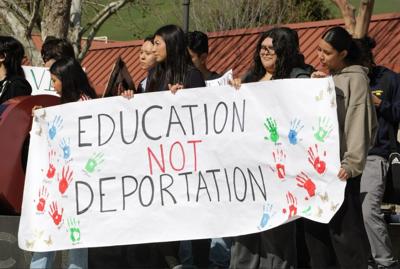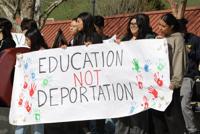
With school out for the summer, some students may no longer have access to crucial support and services available during the academic school year, as fear and anxiety rise in their communities from ongoing immigration raids.
California schools are still safe havens for students attending summer school, meaning federal immigration officers are prohibited from entering them and child care facilities without proper legal authorization. But fears remain unabated for both children of immigrants and their friends, as federal immigration agents in California continue to detain, arrest and deport residents, in what community members say has become an indefinite fixture of the Trump administration.
Research shows that students are six times more likely to access mental health care during the school year than in the summer months, and that the absence of school-based services often leads to worsening mental health for students during the summer.
School social workers are unable to offer routine check-ins and on-campus counseling for students during the summer break, but families can take steps to support their child’s mental health and prepare for what experts are calling a child welfare and human rights crisis.
Talk through your child’s feelings
During the summer, children are much more likely to internalize traumatic events like raids on social media or outside of school, often in isolation and lacking the safe environment of a classroom to talk through their feelings about the day’s news.
To help them feel safe, school counselors and child psychologists recommend that families have truthful, open conversations about sweeps, rather than trying to shield them. Ahmanise Sanati, a Los Angeles Unified School District social worker who works with children from immigrant communities as well as those unhoused, said families should start by asking children: “What have you heard?” and “How are you feeling?” They should then validate their child’s feelings of confusion, anxiety, grief or concern in developmentally appropriate ways, she said.
Both young and older children should understand their family’s risk profile — whether a family member could realistically be detained or deported by ICE, or whether they can be exposed to ICE agents in public spaces, for example. Families should spare younger children graphic or unnecessary details and limit or schedule older children’s social media use, Sanati said. Parents can assure their children that they’ll be OK, but not by telling them, “don’t be afraid” — because fear is a natural reaction.
Sanati says parents should center a child’s feelings, regardless of age, and that when feelings are repressed or minimized, witnessing raids, detentions and deportations, especially in childhood, can exacerbate risks of long-term mental illness.
“Children are already seeing masked individuals with weapons coming into the communities, tackling people and taking them away and putting them into vehicles,” Sanati said. “We have to acknowledge that some very scary things are happening in all of our communities — by lying about the magnitude of this, we may be risking our trust with our children in the future.”
Prepare for emergencies
If a loved one is at risk of being detained or deported, families should prepare and rehearse a step-by-step emergency plan with their child.
Students age 12 and over can role-play scenarios in which they might have to call for legal assistance or help build their legal defense, such as by taking pictures and recording names, badge numbers and descriptions of encounters with immigration agents, if possible. If a family member is detained by ICE, they should ensure other family members, including children, and emergency contacts have a copy of their A-Number, which is assigned to an undocumented person by the Department of Homeland Security, if they have one. Older children and family members should also know how to use the ICE detainee locator to find someone in custody.
“One way to validate a child who is afraid is by letting them know that their family will be ready for a worst-case scenario,” said Marta Melendez, a social worker with LAUSD. “If you don’t feel safe picking up groceries, for example, we have volunteers doing that for families. It’s OK for parents to feel afraid — that should not keep them from seeking support.”
Create a child care plan
Since children are spending more time at home and less time on protected school grounds during the summer, families should also create a child care plan in case a child is left unsupervised due to detention or deportation.
They can arrange for their child to be under the care of another trusted adult, such as a relative, family friend or neighbor, through a verbal agreement. Since this option is an informal arrangement, families should note that the chosen caregiver will not have legal authority to make medical or school-related decisions for their child.
Alternatively, families can have a trusted caregiver complete a Caregiver’s Authorization Affidavit, which would give them legal authority to make medical and school-related decisions on their child’s behalf. The CAA can only be used in California. It does not affect existing custody or parental rights.
Families can also have a state court appoint a guardian for their child, which, unlike a CAA, would grant the new guardian full legal and physical custody of the child. While guardianship does not terminate parental rights, it temporarily suspends them while the guardianship is in place. Families should seek legal counsel before considering this route.
If a child is a U.S. citizen, they should have their passports with them. They should also have important medical documents on file, including a list of medical conditions and medications, when applicable. Importantly, families should walk children through their child care plan and assure them that they will be cared for.
If families are unable to create a child care plan in case of an emergency, or if they become unhoused, they can go to any school that is open during the summer and ask to speak with their Pupil Services and Attendance counselor. Even if a child is not enrolled in summer school or programming, they have a right to stay on campus if there is no other safe location for them to go. PSA counselors can help families find long-term care for their child if necessary.
Families can follow Informed Immigrant steps, which provide guidance on protecting children and how to explain an emergency plan to them.
Find remote mental health support for your child
Families with undocumented or legal status have become increasingly afraid of stepping out — even for doctor’s appointments.
With the risks of seeking in-person care, combined with a lack of on-campus counseling during the summer, students can utilize various remote mental health services and asynchronous resources available for free.
BrightLife Kids, a part of California’s CalHOPE program, provides online behavioral health support through one-on-one coaching with licensed wellness coaches, educational and self-help tools and peer communities. Children age 0 to 12, parents and caregivers can use the program’s remote services to help kids manage worries, express feelings like sadness, anger and frustration, and learn resilience, problem-solving and communication. Coaching services are offered in both English and Spanish. Kids, parents or caregivers do not need to be U.S. citizens, nor do they have to have health insurance. Families can sign up on the BrightLife Kids website here.
Soluna, which is also a part of the CalHOPE program, offers free, confidential mental health support for people 13–25 years old in California. The app allows young Californians to select coaches based on 30 areas of focus, including anxiety, loneliness, substance misuse and demographic preferences such as ethnicity and gender. Users can also join peer support groups in carefully moderated, confidential environments. The app download is available on the Soluna website here.
School-based wellness centers often have year-round mental health intervention and support services available for students. Many offer psychiatric social workers who provide services like trauma-focused cognitive behavioral therapy and programs for children and families who have experienced adverse events or traumatic stress. A full list of wellness centers in California is available here.
Los Angeles Unified students and families can call 213-241-3840 on weekdays from 8 a.m. to 4:30 p.m. to get access to mental health services. Families can also directly refer their children to in-person or telehealth counseling through a referral form for the School Mental Health Clinics and Wellness Centers.
Practice healthy coping skills as a family
According to Melendez, families can prepare for scenarios like an ICE raid, detention or deportation by preemptively building their and their child’s mental health tool kit, similar to an emergency plan. Research shows that even basic mindfulness interventions can mitigate the short- and long-term negative effects of stress and trauma, and these techniques, when taught bilingually, are especially effective for populations such as the Latino community.
To start, Melendez recommends learning mindfulness practices such as box breathing, butterfly hug, guided meditation and positive affirmation, which are common techniques known to help children regulate their nervous system, cope with symptoms of anxiety or depression and perform better in school. Parents and caregivers should practice these techniques with their child to model calming rituals and build emotional resilience as a family unit, Melendez said.
“You should also prioritize something that is a positive outlet for the child,” Melendez said. “Whether they like to play sports, to write about their feelings, draw about their feelings, sing about their feelings, if they want to dance about their feelings — make sure that they have a way of processing all the emotions that they are experiencing.”
Data indicate a spike in both substance use and feelings of sadness among adolescents during the summer, which worsens in part due to unstructured routine, increased isolation and increased social media use.
To create a sense of normalcy for children, Melendez said families should do their best to maintain healthy routines and hobbies during the summer, especially those that promote social connection with their peers.











(0) comments
Welcome to the discussion.
Log In
Keep it Clean. Please avoid obscene, vulgar, lewd, racist or sexually-oriented language.
PLEASE TURN OFF YOUR CAPS LOCK.
Don't Threaten. Threats of harming another person will not be tolerated.
Be Truthful. Don't knowingly lie about anyone or anything.
Be Nice. No racism, sexism or any sort of -ism that is degrading to another person.
Be Proactive. Use the 'Report' link on each comment to let us know of abusive posts.
Share with Us. We'd love to hear eyewitness accounts, the history behind an article.